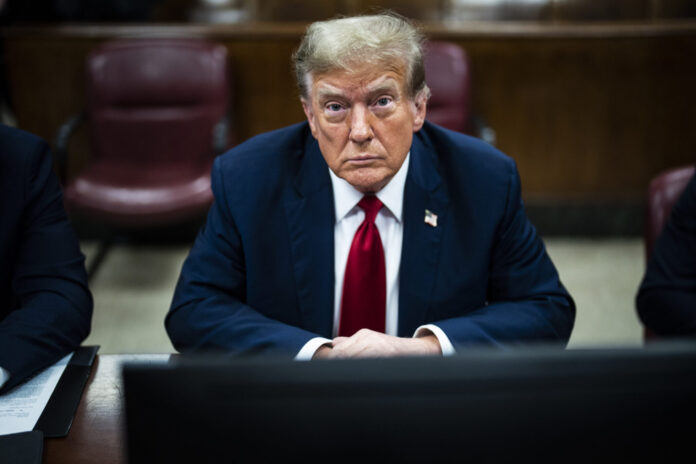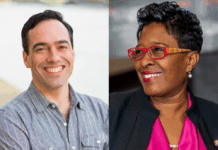
New York (States Newsroom) — The trial of former President Donald Trump kicked off Monday in a lower Manhattan courtroom, marking the first time in U.S. history that an ex-president has been tried on criminal charges.
Trump, the presumptive Republican nominee for president, appeared in the state of New York courtroom, where he is charged with falsifying business records to conceal a sex scandal involving a porn star.
The case, brought by Manhattan District Attorney Alvin Bragg, is one of four state and federal indictments the former president is facing. But because of delays in the other cases, it may be the only one that goes to trial before the November election, significantly boosting its potential political impact.
Jury selection began Monday afternoon and is expected to last around two weeks.
But before potential jurors were brought into the courtroom, Justice Juan Merchan announced rulings on several motions.
Merchan said he would reject a motion from Trump’s defense team citing alleged conflicts of interest involving the judge’s family and asking him to step down from the case.
“There is no agenda here,” Merchan said, adding: “We want to follow the law. We want justice to be done.”
But Merchan said he would not allow the prosecution to introduce evidence about allegations that Trump committed sexual assaults, calling the claims “rumors.”
Bragg’s team wanted jurors to hear the claims, made in the leadup to the 2016 election, to bolster their case that Trump schemed to hide evidence of an affair because he was worried about losing support from women voters.
Merchan also said he would not allow the jury to hear the “Access Hollywood” tape but that prosecutors could introduce into evidence comments made by Trump and caught on the tape. In the recording, which emerged shortly before the 2016 election, Trump brags about grabbing women’s genitals, adding: “When you’re a star, they let you do it.”
Prosecutors asked Merchan Monday to fine Trump for violating an April 1 gag order imposed by the judge. In recent social media posts, Trump attacked Michael Cohen, his former fixer, and the porn star Stormy Daniels.
Merchan said he would hear arguments April 23 on that issue.
Cohen, a former lawyer who has fallen out with Trump, is expected to be a key witness in the case, and Daniels also may testify. Defense lawyers have not yet said whether Trump will testify in his own defense.
Payments to Daniels
At the center of the case are payments totaling $130,000 to Daniels, made by Cohen in the closing weeks of the 2016 election campaign. Cohen admitted in his plea deal the payments were aimed at buying Daniels’ silence about an affair she says she had with Trump a decade earlier.
Trump faces 34 felony counts, and he could face a maximum of four years in prison if convicted. But Merchan also could sentence him to probation without prison time.
Legal experts have noted a major challenge facing Bragg: In New York state, falsifying business records is a misdemeanor, not a felony. However, it becomes a felony if the falsification was done to conceal another crime.
Bragg alleges that Trump intended to conceal state and federal campaign finance violations. The payments, prosecutors allege, were illegal and unreported donations to Trump’s campaign because if Daniels’ story became public, it could have damaged Trump’s image when voters went to the polls.
Bragg also alleges that Trump intended to conceal a tax crime stemming from how Cohen was reimbursed for the payments to Daniels.
Prosecutors don’t need to prove beyond a reasonable doubt that Trump committed these alleged underlying crimes. But they do need to show that Trump intended to conceal them — something defense lawyers are expected to strongly contest.
Political effect

The most important impact of any Trump conviction could be political. Most polling averages currently give Trump a very slim lead over President Joe Biden. But there is some evidence that if Trump were to be convicted of a felony, a small but significant slice of the electorate would be less likely to support him.
Though the charges in the case may seem simultaneously salacious and dry — prosecutors will present reams of sometimes arcane corporate documents — democracy advocates say it in fact involves important principles, and centers on a scheme to undermine a fair election.
“This is not a case solely about hush money payments,” Norm Eisen, a legal analyst and prominent Trump critic who was Democratic co-counsel for the U.S. House Judiciary Committee during Trump’s first impeachment, told reporters Thursday. “It’s about Trump’s alleged actions to hide information from voters to cover up election interference.”
In a small park outside the Manhattan Criminal Court, Trump supporters gathered Monday to affirm their loyalty to the former president, and to lambaste the trial — as Trump himself has frequently done — as a politically motivated witch hunt.
“What’s happening in that courtroom is a total sham,” said Steve Merczynski, of New York City, who wore a hand-embroidered scarf declaring “MAGA again.”

“This is all run by the Biden criminal administration,” Merczynski added. (There is no evidence that the Biden administration influenced the prosecution.)
Another Trump supporter, Dion Cini, said he didn’t want to judge Trump’s personal life.
“I’ve been to Thailand three times,” said Cini, a New Yorker who was once banned from Disney World for holding a Trump 2020 flag on Splash Mountain. “What do you think I do in Thailand, just sit in a chair? No, I go out and have fun and meet women. That’s what we do as men.”
Among the few anti-Trump demonstrators was Marc Leavitt, who stood on a park bench as he played the national anthem and other patriotic songs on a flute.
“I think the rule of law should proceed appropriately, and that’s what’s happening today,” said Leavitt. “And that’s a very good thing for America.”






